S.C. Green's Blog, page 7
August 20, 2018
We have a publisher! And how you can pre-order copies of Only Freaks Turn Things Into Bones
Good news! If you missed out on a copy of Only Freaks Turn Things Into Bones – my children’s picture book about a little Grim Reaper who gets bullied – you can now pre-order it here.
(Only the books are available right now. In the coming weeks we’ll be adding pre-orders for t-shirts and art prints).
One copy of the book will cost $15 USD, for a hardcover 40-page high-quality picture book featuring Bree’s remarkable illustrations. There will be a limited print run, so make sure you pre-order so you don’t miss out!
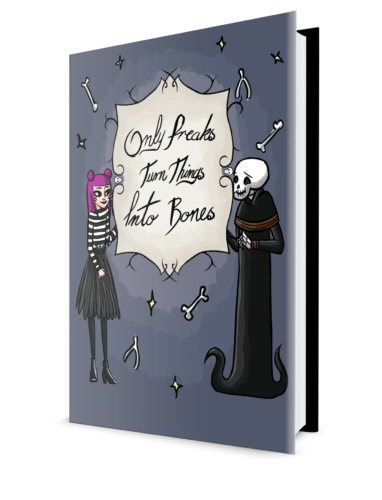
On to our other exciting news: we are so incredibly excited to announce that Only Freaks Turn Things Into Bones caught the eye of a real-live publisher, and after some back and forth with Michelle Lovi at Odyssey Books, we’ve decided to accept her offer. Only Freaks will be published under the Odyssey imprint Obscura.
What does this mean for the book?
Having a publisher behind us means we can make Only Freaks Turn Things Into Bones better than we ever imagined.
Most exciting for us, it means that we have access to distribution to get the book into schools, bookshops, and libraries across New Zealand and Australia. We’ll be able to spread Little Death’s anti-bullying story far and wide!
The quality of the book will also be improved. Instead of being softcover on so-so quality paper, Only Freaks will now be published in hardcover on high-quality heavy gloss paper.
We don’t have a finalised publication schedule yet, but we’re expecting the books to start hitting stores in early 2019.
Thank you so so much for coming along on this adventure with us. Without your support, this amazing opportunity would never have happened! Don’t forget to pre-order your copy today to avoid missing out!
August 16, 2018
Dark, sinister, alluring – 7 gothic perfume and scent companies
Perfume and scents are one of those lovely grown-up things that I’ve never been into that much. And then, in 2009, my husband and I went to a perfume factory in Egypt and learned about natural oil perfume. It didn’t irritate my skin like the cheap products I was using, and there was this exotic layering of scents that transported me to other places and times. I got myself a beautiful glass bottle shaped like a camel (of course) filled with a scent called Jewel of the Nile, and I was hooked.
I love the ability of scent to create an entire world, and it’s something I try to embrace in my books because obviously, I don’t recognise people by their faces. I often browse online scent catelogues like the ones below for the chosen scents for my characters. It would be a dream come true to one day have a scent collaboration.
In the meantime, if you’re looking for a new scent to match your dark mood, here are seven of my favourite moody and gothic perfume companies.
1. Black Phoenix Alchemy Lab
Purveyors of fine esoteric goods, perfumes and potions.
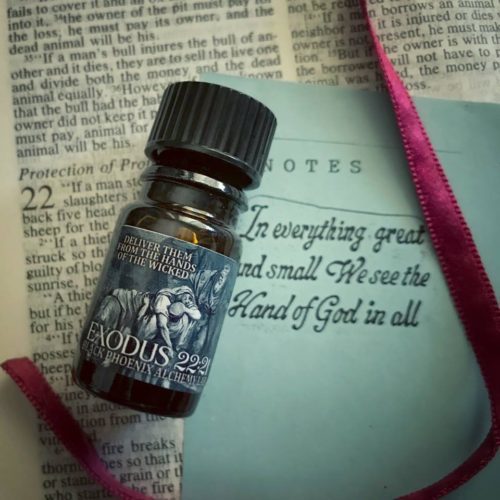
The classic, the one, the only … BPAL has been around since I was a baby bat goth back in the early 200s. This was the first company formulating scents with a dark, romantic, gothic tone, and they’ve basically been rocking their thing ever since. Every scent comes in a beautiful dark glass poison bottle with artistically-designed labels and a poetic description, and every scent is a new heavenly experience. BPAL has media tie-ins with movies and series like Crimson Peak (my first BPAL purchase was from this collection), and Neil Gaiman’s American Gods, and they’ve also collaborated with my favourite blog Haute Macabre.
Favourite scents: How to choose? Sherlock Holmes (A fastidiously clean scent, with a dash of pipe and cigarette tobacco. Faintly beneath, you catch the fragrance of a smear of greasepaint, a stray horsehair, and a whisper of Moroccan leather and rosin.), Bram Stoker (Bourbon vetiver with opoponax, Italian bergamot, and hay absolute.), or Bordello (The scent evokes images of velvet-lined Old West cathouses, tightly laced corsets, rustling petticoats and coquettish snarls of pleasure. Bawdy plum with amaretto, burgundy wine and black currant.).
Other notes: All oils (except those containing beeswax, honey and butter extract) are vegan. No animal testing and all ingredients ethically sourced. BPAL also regularly release exclusive scents to raise funds for causes they believe in, including a Good Omens collection from the book by Neil Gaiman and Terry Pratchett that raised funds for the Orangutan Foundation UK.
2. Seance Perfumes
Hauntingly beautiful scents for those who want to be remembered.
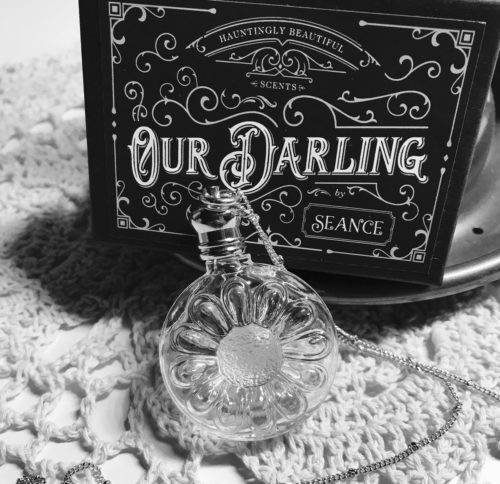
I stumbled across Seance Perfumes randomly a couple of months ago and were completely sucked in by their stunning branding and intoxicating descriptions. I mean, “Hauntingly beautiful scents for those who want to be remembered” – how perfect is that? Answer: SO perfect. I am now wearing Man of Letters all the time. Seance also offers “tear-catchers” (totally a myth, actually Victorian perfume bottle jewellery) to store and wear your perfumes, and I waaaaant one.
Favourite scents: Man of Letters (scotch, mahogany, smoke, leather), Parlour Ghost (black tea, bergamot, lavender), The Witching Hour (smoky chocolate, cedarwood, saffron, sandalwood).
Other notes: all ingredients are vegan-friendly.
3. For Strange Women
Small-batch artisan perfume with avant-garde concepts and a timeless handmade aesthetic.
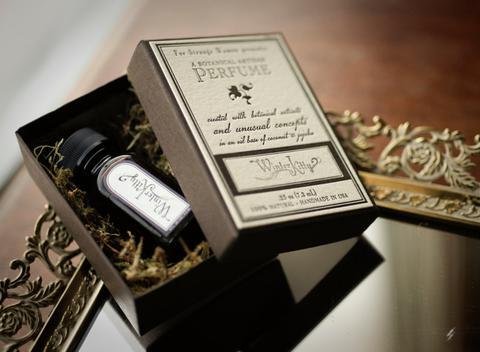
This artisan perfume store has been operating since 2009. One of their most popular lines is the Lunar perfume series, a perfume subscription with a new scent to celebrate every new moon. They also stock beautiful perfume lockets and amulets. Many of their scents carry ritual and alchemical significance. Their aesthetic and their scents are pared back, natural, botanical, and wispy. Anyone who creates a scent called ‘Winter Kitty’ is a damn fine human.
Favourite scents: Rain (recreates the delicate aromatics that fill the air after a storm. Sweet traces of ozone, damp ground, and mushrooms fill the freshly cleaned air. The scent of Eucalyptus and Douglas Fir are released from the branches of a northern landscape. Cool petrichor evaporates quietly from your skin into the atmosphere), Winter Kitty (a blanket of snow and evolves to a comforting base of vetiver, woods, and frankincense. A sweet musk of amber, rose and vanilla complete the scent of a house cat as he returns from a winter walk, with chimney smoke and brisk air lingering in his fur), or French Oakmoss (a tree lichen with a dark green, powerfully grounding aroma. A light anointing can pull the wearer deep into meditation and restore a sense of balance. Lavender and violet leaf lend brighter green overtones while the tenacious mossy base remains for a long drydown.)
Other notes: 100% all natural ingredients, many vegan.
4. Whisper Sisters
Purveyors of unique hand-blended perfume oils.
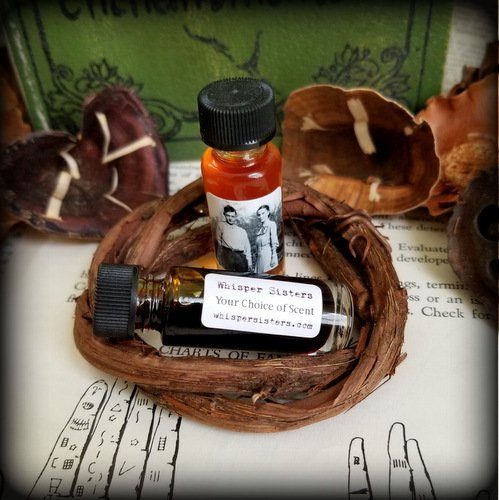
Whisper Sisters have been creating and selling unique perfume oils for more than 20 years. They specialise in resinous, earthy, patchouli, woodsy, and balsamic based blends. You can choose from a long list of scents, then decide if you want screw-top or roll-on bottles, and you’re golden.
Favourite scents: Bad Witch (nag champa, frankincense, sandalwood, dragon’s blood, aged patchouli), Balefire (sugar, nutmeg, snoke, lemon, Egyptian musk, patchouli), or Wood sprite (red rose, oud, black spruce, birch, honey absolute, oak moss, Spanish moss, patchouli, blood cedar).
Other notes: Prices are inexpensive compared to other houses. They might be a great place to start if you want to try indie perfumes for the first time. Vegan-friendly: no animal testing and no animal products unless explicitly noted.
5. Solstice Scents
An array of unique and intriguing fragrances for both men and women.
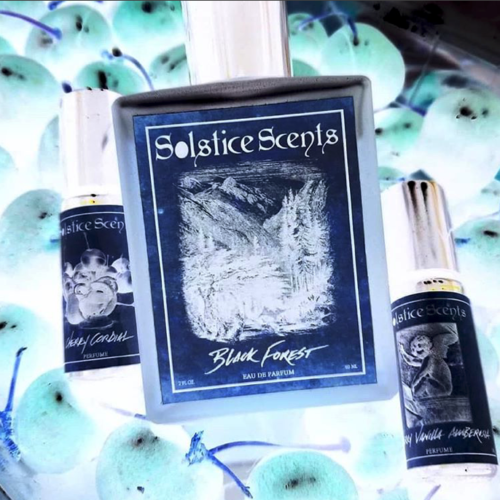
Ignoring the strange 90s website format, Solstice Scents offer a vast range of unique perfume oils and other bath and beauty products. Many products also have ritual and alchemical purposes.
Favourite scents: Basilica (labdanum, vanilla, frankincense, rosewood, myrrh, sandalwood, galbanum), Conjure Dark (amber, frankincense, sweet incense smoke, dried rose petals, sandalwood, vetiver, woods, oud, vanilla), Victorian tea room (palmarosa, kumquat-orange marmalade, chamomile, rose, lemon, black tea, oriental base).
Other notes: All perfume oils are vegan unless otherwise noted (some contain a honey extract). No products are tested on animals.
6. Hexannacht
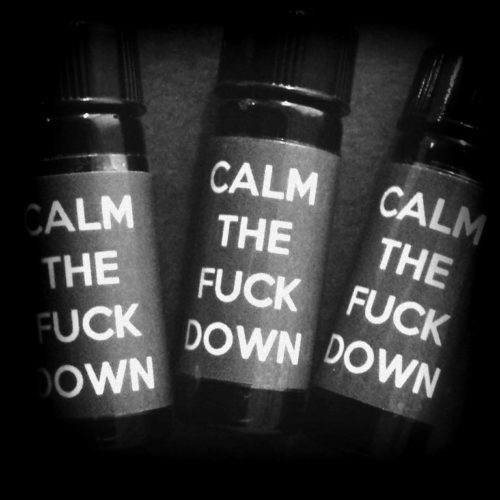
Hexannacht is so sexy, and I’m not just saying that because I love anything the evokes German witches. I love everything about this brand, from the hand-drawn labels and classic poison-bottle shapes to the dark, almost heavy metal scents. Get into your satanic groove with these unique scents.
Favourite scents: Black Philip (black amber, dragon’s blood, black musk, tonka, black oak, firewood embers, blackcurrent, soft woods, black pepper), Blood moon (dragon’s blood, smoked vanilla, pipe tobacco, beeswax, sanguine mask), or the bell witch (blood musk, ebon musk, feral musk, nag champa, sandalwood, incense, guaiac wood, vanilla, bergamot, aged dark patchouli, woodsmoke, amber.)
7. Strange Fire and Fumery
Candles, incense and perfume that’s a little different.
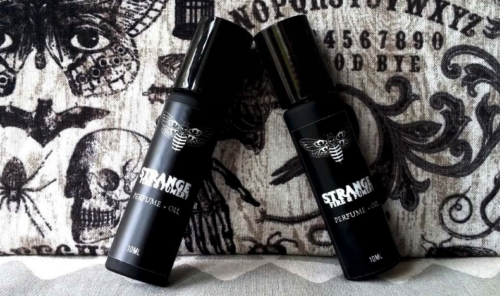
The perfumer behind this unique brand has been working with fragrance for over 10 years and brings principles of aromatherapy and perfume design to incenses and candles. I love the illustrations, dark labels with Death’s Head Hawkmoth logo, and of course all the luxurious and delicious scents.
Favourite scents: Witch wife (Pine trees that scrape the sky, rich sandalwood, teak, an old cottage, a trail of forget-me-nots to find your way home), Rook (Wet leaves, musky black feathers, slow vetiver, a stiff branch, the slow death-creep of Autumn, a fussy Underworld messenger), or Cara Mia (a trip to a midnight rose garden, backed with the decadent brooding sweetness of blackcurrant).
There you go – seven purveyors of dark and delicious scents, for all your perfume needs. And if you want to read something dark and awesome while you smell good, check out my book The Castle of Earth and Embers.
August 15, 2018
8 tips for suviving (and rocking) your next writing conference
I just got back from the Romance Writers of New Zealand annual conference, and as usual, it was brilliant. Bella Andre spoke about her incredible journey from being dropped by her Big 5 publisher to becoming one of the most successful indie authors ever. Historical author Grace Burrows spoke with humility and humour about resilience and survival as a writer. We had an amazing workshop about forensics for writers from an ex-Federal agent, and we ate lemon and banana, walnut, and poopy seed muffins.
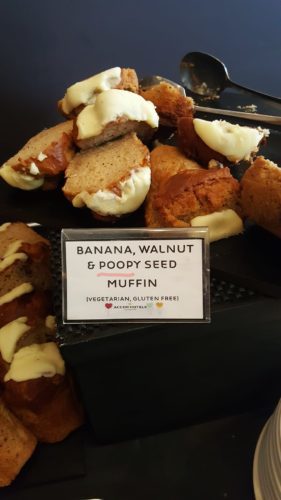
Photo by Vivienne Matthews
This conference is a highlight of my calendar every year. While CDH and my family and friends are incredibly supportive of my career, there is something special about sharing the trenches with other writers. No one else understands the voices in my head like other people who hear their own voices. No one else gets the weird love/hate relationship with Amazon or knows what you mean when you ask “wide or KU?” It’s special.
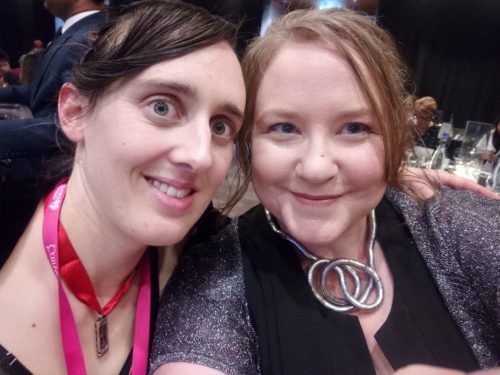
With my lovely friend Emma at the RWNZ Conference awards dinner. My book Hollow won second in the best short romance category for the 2018 Koru Award. Photo by Emma Cameron.
The first time I went to a writers’ conference was an RWNZ way back in (I think) 2010. I wanted to pitch my fantasy novel to one of the agents attending, and I thought that even though I wasn’t a romance writer I’d find something of value in the keynotes and workshops. What I came away with was this tremendous respect for a genre I’d previously derided, and the writers, editors, agents, and publishers (majority women) who lift up and support each other.
It’s an honour to be hanging out ten years later with 22 books under my belt as a workshop presenter. I found it interesting to meet other non-romance writers who’d come along because they’d heard this was the best conference for craft and business of writing. They wandered the halls looking a bit shellshocked by the wealth of information thrust upon us by generous speakers.
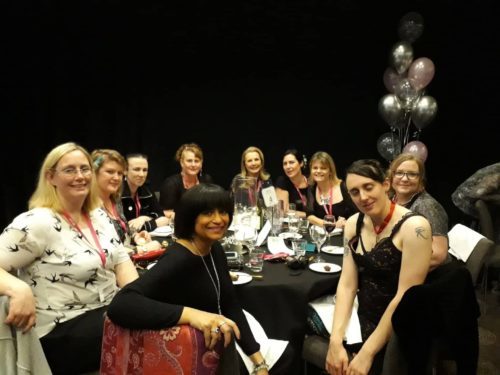
Our table at the awards dinner. Sitting with the amazing Nalini Singh (OMG I’ve been reading her Psy-Changeling series for years. She’s such an inspiration). Photo by Emma Cameron.
So yes, you should go to a writers conference! You’ll come away with an injection of inspiration, tools and resources, and some brand new writer friends. Here are my tips for rocking your next writing conference. I hope you find them useful.
1. Go with a goal
I’m an introvert who gets really nervous when faced with walking into a room full of people who all seem to know each other. But my brain also responds really well to action-focused plans and I kind of enjoy challenging myself. That’s why I approach any events I’m nervous about with a goal in mind – it turns the event into a game. This is especially good for cocktail parties and conference mixers. Set yourself a goal of starting 3 conversations, and see what happens.
(Here’s a hint: the question, “so what do you write?” is a pretty sure-bet.)
Having a goal also helps you to plan the workshops you want to attend. If your goal is to improve your writing then you’ll end up in different workshops than if your goal is to improve your marketing or learn more about the book business. You’ll also make different choices depending on if you want to self publish or are looking for a trad-pub deal.
Because I’ve got quite a few books out now, my goal for this conference was to a) collect 3 tips to improve my business and b) gather interesting stories from the trenches. I focused more on listening to other attendees as they spoke about their careers and struggles and triumphs. I’ve come away with a deep appreciation for the career I have and a renewed sense that there really are no rules and many different paths to success.
2. Meet-up with others beforehand
If this is your first ever conference, you might get that intimidation factor x10. You could post on the conference’s Facebook event or a writers’ forum asking to meet up with other local first-timers for a coffee. That way, you’ll know some familiar faces once you show up at the conference.
Last year, the conference was out of town for me and the hotel was a bit expensive for the two nights I needed to stay. I put up a message on Facebook asking if anyone would be interested in sharing an AirBNB house for around ⅓ the price. We ended up with a group of 7 of us (many first timers) and we all got to know each other, so this year we hung out again, and it was brilliant.
3. Look for ways to save money
This is not a writing tip but just a general life tip. A 2-3 day conference with accommodation and food and extra events can end up running well over $2000. That’s a lot of money, especially if you’re not a best-selling author (yet). There’s not much you can do about the fees, but there are other ways you can save a few sheckels.
My tips are:
Make sure you’re on advance mailing lists and keep an eye on Facebook so you don’t miss earlybird pricing. GET EARLYBIRD PRICING.
Look for cheaper accomodation nearby. I often stay with friends for a night in the city to cut down on the number of nights I need to stay in a hotel. AirBNB flats are often cheaper than hotel rooms with more amenities. This year I stayed in the hotel for one night (what a treat!) and slept on a friend’s couch for the other.
Consider if you really need to go for the whole programme. RWNZ runs over three days with a full-day craft workshop from one keynote speaker on the Friday. This workshop accounts for around half the fee. I never go on the Friday, because the keynote speaker often summarises a lot of the learnings from the full day during their weekend address, and honestly two days wipes me out so much I can’t even imagine three.
Pack some simple breakfast food you can eat in your room. I like to pack things like apples and museli bars so I don’t have to buy hotel breakfasts.
Don’t buy lots of alcohol. This is a good idea in general, as you don’t want to be the one getting slobberly drunk in the hotel bar.
Check if there are scholarships, volunteer slots, or other discounts available.
Save your receipts. Remember, writing conferences are tax deductable!
Also, if you know you go to a conference every year, put aside a little money each month in a separate account. That way you won’t be surprised without funds when the new programme is announced.
4. Ask lots of questions! But make them good questions.
I usually detest Q&A at writers’ conferences and festivals because questions tend to fall into one of three categories: “My question is just an excuse to talk about my book”, “My question is just an excuse to demonstrate how much I know about the keynote speaker.” or “My question is just an excuse to try and lock the speaker into a pseudo-intellectual debate.”
This weekend impressed me with the intelligent and useful questions other attendees asked. I only heard a couple of very book-specific questions. Please, don’t be afraid of asking questions and remember that even if you think your question is silly, there are probably fifty other people in the room too afraid to ask the same question.
Please, ask questions, just run your question over in your head first to make sure it doesn’t fall into one of the categories above.
5. Dress smart
So many writers stress about what to wear to writing conferences – I see this question on forums all the time. I think it’s part of our introverted nature. We’re worried about impressing people. We want to fit in.
My rules for conference attire are:
Be comfortable. Writers conferences have long days packed with sitting, running between sessions, standing around talking to people, and waiting for a spot in the lunch buffet. Wear supportive shoes and clothes that make you feel great.
Be professional. Remember that you’re meeting with colleagues in your industry. You don’t have to dress like you’re going to a job interview, but neither should you look like you just rolled out of bed. Avoid t-shirts with offensive slogans unless that’s your brand.
Bring layers. I found hotel air conditioning rather tempermental, so I have lots of layers in case I’m too hot or too cold.
Stay on-brand. My brand as an author is an extension of my personality, so I like to reinforce that by wearing clothes that demonstrate I’m a little bit weird and a little bit fun.
6. Block out some alone time.
If you’re an extrovert you’ll probably find conferences super fun all the time. But many writers are introverted and struggle to maintain energy levels after being surrounded by people for so many hours. If this is you, I recommend scheduling out a block mid-way through the conference where you can get 10-30 minutes completely to yourself.
For me, this is usually the block on Saturday between when workshops finish and the awards dinner begins. Others miss an afternoon workshop slot or take off during lunch to kip in their room.
Conferences are a non-stop rush of noise and learning and laughs and excitement and OMG SO MANY PEOPLE. You start to feel like a bit of a zombie. Even just ten minutes alone can be all you need to recharge for another round.
7. The best way to promote yourself is to be kind
All the fancy swag in the world won’t make a difference to your career if people remember you as the pushy, crazy, or annoying author who wouldn’t shut up about yourself. It can be hard to turn off your desire to promote your book when you’re surrounded by so many people who could help your career, but the best way to get their attention isn’t to shout, “look at me!” It’s to ask, “how can I help you?”
Listen more than you talk. Help new authors find their feet. Volunteer to help in any way you can. Give out useful information that could help others. If you see someone looking lost and lonely, invite them in to your circle. Do your absolute best to remember people’s names and faces. Give people the benefit of the doubt if they rush off or arrive late or duck back to their room when you want to speak to them – they might be dealing with something personal that’s taking a toll.
If you sit next to an agent, editor, or superstar author, instead of harassing them about your book, ask them about their day, their family, their work. People love to talk about themselves and I guarantee you’ll end up in a conversation that might eventually involve you talking about your books.
I always go in to a conference thinking that no one is there because they want to read my books – but they do want to learn, and I’m happy to talk about things I’ve learned in my career so far. You never know who might in future hear about a really cool project and think, “I know who’d be perfect for that – a nice and helpful and slightly weird paranormal writer I met at RWNZ18.”
8. Make a game plan when you get home.
The writers conference doesn’t end when you arrive home. You’ve still got work to do to make the most of the experience. Create a game plan as soon as you can (I do mine as a running list at the top of my conference notes file during the weekend) to outline the tasks you want to do in the following days and weeks.
Your game plan should include:
Going through your notes and pulling out a list of actionable points to implement.
Actually implementing those action points (a hundred million billion times harder than the previous bullet).
Friending people on social media and messaging new friends, organisers, or your favourite panelists to say thanks for the awesome event.
Follow up with the agents and editors you pitched with any requested material. I spoke to an editor last year who said most people who she requests material from at conferences DON’T send it. Crazy! You’ve made the connection and you’re already in with a good shot so just DO THE THING. Agents and editors do expect you to read through your project one last time, but the sooner you send the info, the better.
Compare your goals with what you actually achieved, and adjust plans for the next year/conference.
Write up a blog post and stick some pics on your social medias sites so people know writers have fun, too.
Note learnings you might want to keep in mind for next conference – eg. do/don’t attend certain pre-and-post conference events.
Buy the books from the speakers you loved and start reading them. For me this is one of the biggest ways I learn from speakers – when I can see how they apply their learnings in their books.
As I said, this year I was honoured to present a workshop on creating reader-centric mailing lists for writers. I regularly give workshops on various aspects of writing craft, marketing, and rocking your brand for writers and other creatives. My next event is a panel on writing sex and romance at the National Writers Forum (put on by the New Zealand Authors Association) on Sat 22 September.
I’m also available to speak and run workshops at conferences and festivals anywhere in New Zealand (or in the world). If you’re interested – contact me!
Don’t want to miss my essays on writing, creativity, or rocking life as a working artist?
Sign up for the Creative Rebel newsletter to have each weekly article delivered to your inbox.
August 6, 2018
Wacken Open Air 2019: I’ve got my tickets
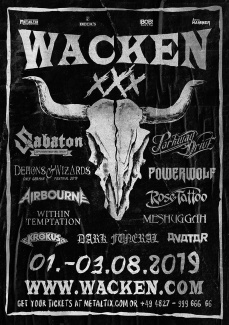
The 10th wedding anniversary is the ‘tin’ anniversary. Tin is a metal. This means the only appropriate way of celebrating is to do something totally metal. So the Cantankerous Drummer husband and I brought tickets to Wacken Open Air 2019.
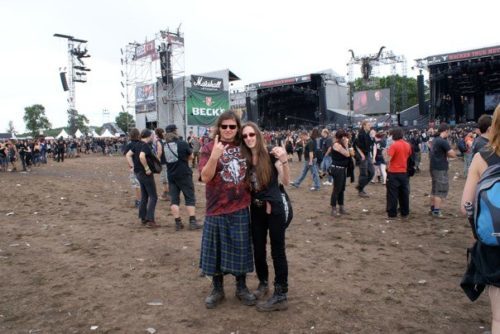
If you don’t know what Wacken is, then you’re probably not into metal, which is totally fine. But basically – Wacken is metal mecca, a pilgramage site for heshers, bogans, metallers, and rockers around the world. It’s the largest and one of the longest-running metal festivals in the world, and it holds a special place in many metalheads’ hearts, including ours.
Every year, 75,000 metalheads descend upon the picturesque farming village of Wacken in Northern Germany, where we camp in a muddy field and watch 150 bands take the stage over a three-day festival. There’s a beer garden, a medieval market, and a whole host of other awesome activities to keep you occupied and very, very drunk.
Yes, Wacken is the festival that installed a beer pipeline, because they are just that badass. It’s also the festival elderly metalheads break out of their resting homes to attend.
The lineup is always a mixture of metal subgenres, so you can see classic metal acts like Iron Maiden alongside extreme black and death metal, and there’s always amazing medieval and folk bands as well. Eight bands on this year’s lineup have been announced so far, but I am most excited about the Demons & Wizards show (only festival date in 2019, playing songs from a new album OMG), Powerwolf (I just got into them in a BIG way), Sabaton, Within Temptation, and Krokus (Play Some Krokus!)
We’ve been to Wacken two previous times – once in 2009, as part of our epic metal adventure across Europe and the Middle East. That was technically our honeymoon. We went again in 2011 because Blind Guardian was headlining and we loved the place so much.
We haven’t been able to do much travelling since then because we’ve been building our home. But now that’s finished and our 10th wedding anniversary is coming up, it’s time to return to one of our favourite places in the world.
While we’re in Europe, we’re also going to be travelling through the Czech Republic, Hungary, and Romania with some amazing friends (I am so excited you have no idea) and then heading to England and Wales for three weeks after the festival for lots of castles and trains and more friends and cemeteries and TANK PAINTBALL. (I am going to win).
I might be a wee bit excited. Maybe. Can’t confirm.
I’ve written about some of our previous trips and some tips for first-time festival-goers, if you were interested.
What is a Wacken?
Wacken Open Air 2011: Meerkats, Toilet Quiz Show, and dolphins in the mosh pit
Wacken Open Air 2011: every band I saw at Wacken, reviewed.
Renting a campervan for Wacken
The Unofficial Wacken Gear List
The Wacken Heavy Metal German Phrasebook
Top ten 2-word Wacken band reviews
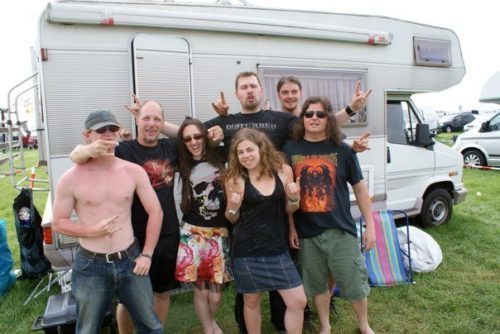
Wacken is awesome and you should totally come! Although you should decide quickly because 60,000 tickets have already been sold.
August 2, 2018
The Book of Nine Scribes – Lovecraft-themed spell book on Kickstarter
The Book of Nine Scribes is super sexy.
What is it? A handwritten/scanned and reprinted 300-page spellbook with a fascinating Lovecraft-themed story behind it, packaged up in a specially-aged and illustrated book and bound in goat-hide leather.
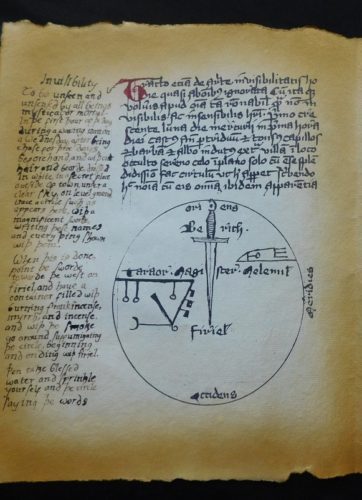
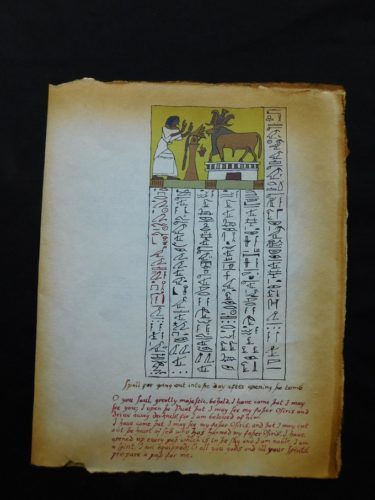
Pages from the 15th Century Munich Manual of Demonic Magic and the Ancient Egyptian Book of the Dead chapters. On both pages, you can see the notes made by the Book Owner.
The history of this spell book is that the original Book Owner knew one spell called “To Call Scribes” and, after concealing it across the first three pages, cast the spell on a large book of blank pages.
From that point on, every morning when the Book Owner would wake up, a mystical Scribe had somehow added arcane lore or spells to the book throughout the night before.
As the pages continued to fill up with magic text, the Book Owner set out to chronicle the experience, and to learn more about the Scribes themselves. Naturally, the secrets revealed by the Book Owner result in a horrifying ending to the story woven between the chapters.
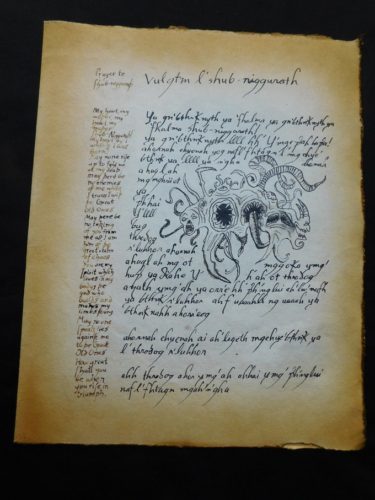
Page from the Lovecraft section.
What I particularly love about this book is that it has an ergodic aspect to it, just like one of my favourite books ever, The House of Leaves. The Book Owners leaves his markings all over the pages as he translates aspects of the text, and his story unfolds throughout the volume. It can be read not only as a spell book but also as a story.
Add-ons include other spellbooks bound in a similar style, including the infamous Malleus Maleficarum and Dictionnaire Infernal.
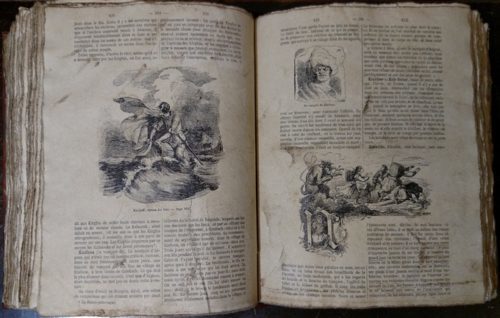
Pages from the Dictionnaire Infernal.
I would 120% have purchased this book if it wasn’t $325, which is about the cost of one of our 2019 Wacken tickets. So instead, I’m sharing it with you in the hopes that you buy a pretty book of spells and I can live vicariously through your bookshelf.
Go on. Back the Book of Nine Scribes. Cthulhu commands you.
August 1, 2018
Writers, how to research your diverse character

Image via Ebony.
Ah, diverse characters. That old wheel horse.
There’s a lot of discussion in the writing community about who has ‘permission’ to write certain stories. Mainly, these are the stories that feature non-cis, non-white, non-straight, non-’western’, non-able-bodied characters. The #ownvoices movement aims to lift up the writers who are telling these stories from their lived experiences, which is fucking amazing and about bloody time.
However, the conversion can sometimes veer off into a battle of who has the rights to these characters. Is an able-bodied person allowed to write a disabled character? What about a white person writing a POC? Does the identity of the writer preclude them from certain narratives?
There’s no easy answer here, which is why it’s something that’s discussed ad nauseum inside any discussion about diverse literature. And it isn’t just fiction that gets this treatment. Historian T K Roxborough wrote recently about this issue when writing histories. “We should welcome the telling of histories – in whatever form they take – because no one person can hold the ‘right’ way of telling a history: people are flawed. Although, the better tellings are those that have done lots of research and used a range of sources.”
Speaking as a fiction writer with a disability, I have opinions! My opinion is this: we’re all writing fiction. It’s all flying saucers and happily-ever-afters and dinosaur capers and mysterious strangers. We all get to play in the same sandbox of our imagination, and I don’t think one fiction writer or reader should be telling another what they can/can’t write.
There is a real and present problem that there isn’t enough diverse fiction in the world. Many people can’t see themselves reflected in the characters in books and films and TV. Many people don’t have heroes that look or think like them, and that can do lasting damage, especially to children.
Part of that problem is that there are not enough non-white, non-male writers. Part of the problem is that writers aren’t writing enough diverse characters. Part of the problem is that the gatekeepers (reviewers, award committee, publishers, booksellers) aren’t lifting up the books with these important stories. Part of that comes from our own perceptions as readers – if we see a book with a black hero or heroine on the front, we think it’s a certain kind of book (even if it’s not) and bypass it for something that feels safer for us (usually with a white cover model). It’s a complex issue with lots of facets, but the end result is the same – a bland landscape of same, same, same.
The truth is, we don’t live in a world that’s all-white, all-cis, all-straight, all-able-bodied. We live in a wonderful, diverse melting pot of different experiences. But that’s not reflected in much of our literature. Many writers – some from minority groups, some who are your typical white, able-bodied, non-disabled type – think this is silly and want to change it. They’re all on the same team, which is why I think the permission argument is so damaging to the cause.
If you say that white people can’t write about non-white people, then you contribute to the problem by ensuring a whole lot of new books telling white stories by white writers in a white-washed world hit the market.
On the flip side, I totally get where that outrage is coming from. We have a history steeped in colonialism and ableism and homophobia and all sorts of other isms and phobias that mean real people have endured a world of bullshit. As a ‘white, able, cis’ writer, when you write a story about a minority group and you get shit wrong, you can contribute to actual hurt and damage done to that group. When a person with a disability reads books, it would be nice if not every single one of those characters dies.
What’s the solution? Research.
Research is how writers of fiction get shit right. Whether it’s making sure your WWI soldiers aren’t using weapons that weren’t invented for another 15 years or creating an authentic experience of life in a wheelchair, you need research. Because you weren’t a soldier in WWI, the same way you might not know what it’s like to live in a wheelchair (and being wheeled across the parking lot after a brief hospital stay DOES NOT COUNT).
If you’ve got an idea for a book with a diverse protagonist who has a life outside of your lived experience, then you’ve gotta research. Here’s a simple as fuck guide to help you do the best job you can.
1. Get organised
This is the first stage of any research project. You need to put together a research plan so you have time to fit in everything you need to do before your deadline. If you’re a prolific writer like me (I’m writing a book every two months) then you need to get this research done fast, but you also got to get it right, so this stage is super important.
You need to:
Set out a timeline for your project, including deadlines – when you need to start writing the book, when you need to finish the draft, etc.
Plan the stages of research (general, specific, interviews, sensitivity readers). Identify the key areas of research of what you know already about the novel (character, location, technical details).
Book interview times with subject matter experts and those with lived experience (I like to do this at the beginning of a research period if possible, as the dates serve as deadlines to help me focus).
I like to talk to people with lived experience, and I prefer to speak to friends or friends-of-friends, so I usually start by throwing a note up on Facebook and ask people to hook me up with someone who can help. I’ve found so many amazing and helpful peeps that way. There are also networks of people who work as sensitivity readers, such as Writing In The Margins.
2. Exploratory research
In the beginning, you probably don’t know much about what you need to know, so you need to do some reading to figure out… what you want to know.
For me, exploratory research is happening all the time as I see and learn and read and watch new things. It also happens from the time I get an inkling of an idea for plot or character. It’s the research you do when you decide you’ll be writing a heroine with an amputation but you don’t know what that means or what it looks like.
You need general background knowledge about your subject. For this stage ONLY, Wikipedia or other general knowledge websites or books are a good place to begin. It will give you a basic overview of what you need to know. Then, you can dive into tangents that interest you, find unique books (I love biographies and interesting history books) and also look for academic essays and papers. This is also a time when I like to throw up a question on Facebook. “Hey, I’m researching Slavic mythology and being bisexual. Does anyone have any books or documentaries they can recommend to me?” I get LOTS of cool responses.
3. Narrowing your focus
As you research, you’ll begin to put your ideas together and your story and characters will start to emerge in your mind. It’s around this time you’ll start developing certain questions and lines of research you need to pursue. As well as looking in the same places for more specific research, you will need to:
Create a list of specific questions. This list might include things like: how does a person with an above-the-knee amputation have sex? Or what slang words would a POC who grew up in New Orleans use? These are the questions it’s particularly useful to talk to a friend or source about.
Learn about stereotypes. There are common stereotypes about all minority groups that you need to be aware of if you’re writing about them. Many stereotypes are harmful and offensive to the groups involved – and since you’re not of that culture or group, you might not realise you’ve done something harmful. On the other hand, stereotypes can also be great tools for a storyteller, enabling you to dig deeper into the world of your character and subvert expectations. You need to be careful not to be too broad here and remember that stereotypes aren’t only between ‘western’ and ‘other’. For example, YA writer Malinda Yo writes about the problems researching stereotypes about Asian characters – ‘Asia’ is quite a large geographic area encompassing many diverse cultures. Stereotypes white America has about Chinese people are very different from stereotypes the Chinese have about Taiwanese people.
Visit a reference library. If you have access to a university or society library complete with subject-matter librarians, you’ve hit research gold! You can speak to the librarian about the questions you’ve identified and he/she will direct you to where to look for answers. Don’t expect the librarian to do the work for you.
Conduct your interviews. Sit down either in person or via Skype with your awesome source and pick their brains about their life and experiences and any other questions you have. Remember that they don’t speak for their entire culture or group and their experiences are personal to them.
5. Start writing
Now you get to put your research together and put words on the page. It’s a little scary, but also heaps of fun!
When writing, try not to let details hold you up. As you write you’ll no doubt come up with many more research questions along the way. When I was writing Wedding the Wolf, I realised during one scene that I didn’t actually know how a person put on/took off a prosthetic limb. When I’m in the flow of writing I leave a gap in the text and a note about what I need to know, so I can come back and add the details later.
6. Ask for feedback
When I write characters from cultures I’m not familiar with or with disabilities I don’t possess myself, I usually ask someone within my network (possibly one of my original sources) to have a read over the story and make sure I haven’t made any glaring mistakes. Usually, their feedback is positive – thanks to all the research I’ve done – but they will add one or two interesting details that add depth to the story.
Even if you conduct extensive research and write a compelling story, you may still end up with readers accusing you of getting things ‘wrong.’ Many people have a high personal stake in certain types of stories or certain characters because of their own lived experiences. They may take offense to your portrayal of a character even if you’ve worked hard to create something that doesn’t conform to harmful stereotypes.
They have every right to do so, and you shouldn’t get angry or try and stop them. Readers are complex people and every one of them will have their own reaction to a book. The best thing you can do is remember that they don’t speak for everyone, focus on what you’ve achieved that you’re proud of, and learn and listen so you can improve in the future.
I believe that even if experiences aren’t universal, emotions are. Guilt, pain, humiliation, rage, love, regret, devotion – these are universal to the human condition. By rooting a character in these universal emotions, you can create someone who appeals to a wide range of readers, even though the character’s experiences are vastly different from their own.
I also believe it’s the duty of writers who believe in the importance of diversity to lift up diverse voices and help marginalised writers to be heard. As well as creating your own cast of diverse characters, you should help your audience be aware of books by diverse writers who deserve to be heard. Doing these two things with earnestness and grace helps to create an inclusive book community where everyone has the chance to be the hero of their favourite story.
Resources
Writing diverse characters on the GenZ blog
We Need Diverse Books – an organisation dedicated to promoting diverse literature.
Be Brave and Write Inclusively – an amazing list of resources and further reading on writing diverse books.
An interesting Tumblr thread on checklisting (ticking off a diverse cast of characters without any thought to their personalities or traits) that’s worth a read.
A list of resources for all kinds of diverse characters on Writing With Color – I use this all the time.
Don’t want to miss my essays on writing, creativity, or rocking life as a working artist?
Sign up for the Creative Rebel newsletter to have each weekly article delivered to your inbox.
July 30, 2018
I’m a finalist for a 2018 Women of Influence award

In 1893 women in New Zealand won the right to vote. In those 125 years, a lot has changed, but there is still much to do. The Women of Influence programme recognises and celebrates women from all walks of life who make a positive difference in the lives of their fellow New Zealanders.
As part of their programme to help shape the next 125 years for women, Women of Influence award prominent NZ women achieving in their fields at a gala event every year, as well as hosting a forum for current and future leaders to discuss issues affecting women.
I am so deeply humbled to be among the remarkable Kiwi women who are being honoured as finalists for a Women of Influence award. I’m up for the Arts and Culture award alongside Deborah McCormick, director of the SCAPE Public Art Trust, Pianist and composer Gillian Bibby, Hollywood acting performance coach Miranda Harcourt, Square Eyes Film Foundation director Nicola Marshall, and the incomparable literary critic and editor Pro Lydia Wevers. I’m the youngest in that group by… well, it’s never polite to discuss. All these women have made incredible contributions in their respective fields. And there’s little old me.
Blessed be the fruit loops! I mean, wow. Big wow.
Here’s the link to the announcement in the Sunday Star Times. The article is bursting with stories from some of the nominated women. Definitely give it a read!
So yeah, it’s been quite a week with that announcement! I’ll be attending the forum and gala dinner in September to celebrate the achievements of women in New Zealand and throw my voice in on important topics for the future.
July 26, 2018
Post-scriptum: ghosts, bookshops, and ginanigans in Taupo.
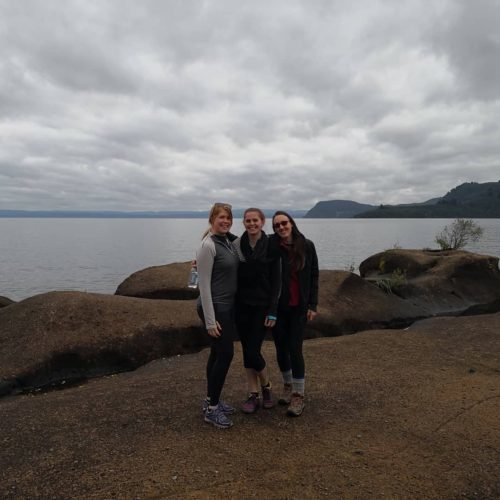
In my ears: The new Ghost album Prequelle and Eluveite’s Evocation II: Pantheon.
Reading: See: Things I’m Reading in July. Just finished The Silent Companions. LOVED IT. Laura Purcell is now a one-click author for me. Also, I started Shaun Bythell’s Diary of a Bookseller, which is a non-fiction book about Shaun’s experiences as a grumpy Scottish git running the largest second-hand bookshop in Scotland. Not quite Black Books level of funny, but it’s definitely got the giggles.
Writing: I’m frantically trying to finish The Castle of Wind and Whispers. This book has ended up a bit shorter than the others (around 70k I think, instead of my usual 90k words), but it just means book 5 will be even more meaty.
I’ve also just finished a rewrite/tidy up of the script for Only Freaks Turn Things Into Bones – we were waaaaaay over the allotted page count, so I needed to tighten things up. I’m going to get a pre-order page set up soon so those who didn’t get a chance to back the Kickstarter can pre-order the book.
I’m also struggling with what to write after I finish the Briarwood series. I’ve got two book 1s in new series that I’ve started and keen to get on with, but I just had this crazy cool idea that’s niggling at me and I want to write it so bad, but it might have to wait until next year. Sigh.
Watching: We just finished Weeds and the latest season of Midsomer Murders. Weeds was… hmmm. I loved the quirky humour and ridiculous characters in the first three seasons, but after that, it went to a bit of a dark place, and I felt like it never really got back again.
On the farm: the Cantankerous Drummer Husband is finishing jobs around the house (and creating new jobs, because that’s how he rolls), like painting our ensuite and tiling the buttery. I have started tackling an epic job I’ve been putting off for four years – sorting the junk in our upstairs bedroom and getting rid of all the stuff we don’t use. So far I have made $155 selling stuff, including a computer that doesn’t work, and I’m barely 1/4 of the way through the room. I’m feeling good!
Also, we have four new baby lambys! They’re so cute!
Loving: Last weekend I road-tripped down to Taupo with my friend Amy (of Northwic fame) to see our friend Sam. We had the best girls weekend – lots of gin and gossip, bushwalks and burgers, hot pools and hugs. My favourite new lines – “I like my tea bags like I like my belly buttons – innie.” and “Have you heard of this show called Vikings?”
On the way down Amy and I also did a side-mission to visit the Be Persuaded Jane Austen costume exhibit at the Waikato Museum. Totally free and really interesting – I recommend having a squizz if you get the chance!
Other things I’m digging – only two weeks until the Romance Writers of NZ conference! I’d better hop to it and write my workshop. \m/ Booking travel through Romania, Hungary, and Czech Republic for next year, and counting down until we can buy 2019 Wacken tickets – because we know how to celebrate our 10-year wedding anniversary in style \m/ Whittakers Dark Salted Caramel chocolate. I could eat all of you. \m/ My silly cats being silly. \m/ Midsomer Murders in front of a roaring fire while the wind and rain howl outside. \m/ People contacting me about exciting new writing opportunities. \m/ planning the bookshelves I’m getting my husband and Dad to make for my office (they might tell me to go to hell once they see the design, but a girl should always aim high). \m/
And I have some BIG EXCITING NEWS I can’t tell you yet but I am dying and I hope I can tell you soon because it’s hard to tell big exciting news when you are dead.
That’s my week, what about yours?
July 25, 2018
5 fears holding you back from writing your book (or finishing any creative project)
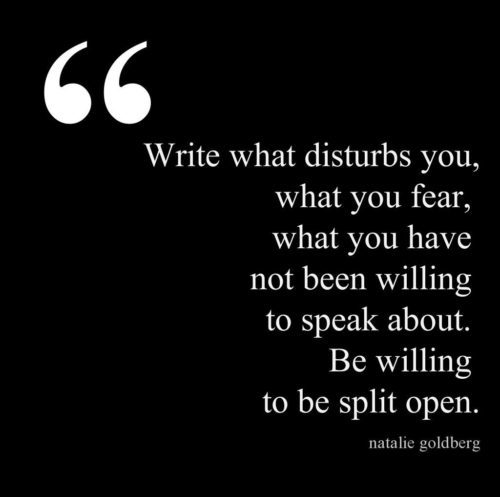
As a kid, I remember being praised for my writing and drawing and creative ideas. On a few occasions, I was invited to the front of the class to read out a story. When I was fifteen years old, my English teacher assigned a project to write a ‘choose-your-own-adventure’ story and my haunted house tale ended up having the length and complexity of an actual tale. She wrote me a note saying I should consider becoming a writer. At senior prizegiving, my art teacher suggested I go to art school.
I was lucky. My parents, teachers, and friends lifted me up and supported my creativity. I can’t imagine not doing this without that support. But even with that support and reassurance, I’m plagued by doubts and fears.
Fear seems to go along with a career in the arts. We live with a constant stream of fears and negative self-talk running through our heads. What if I’m not good enough? What if I can’t pay the bills? What if I fail? What if I succeed? What if everyone hates me? What if I lay it all bare and it blows up in my face?
I’m no different. I’m terrified every time I release a book or publish a blog post. The day I hit the button to launch the Only Freaks Turn Things Into Bones Kickstarter I was a total wreck – cold sweats, jitters, the whole deal. I thought everyone would think it was dumb, that no one would back it, that people would mock me about the subject matter (“she’s so lame!”), that I’d fall on my face.
But I still did it.
Because the alternative to facing your fears is even worse – sitting at home, not doing anything, wondering if you could have done it if only you gave it a chance. Honestly, that’s what I’m afraid of more than any of the below fears.
If you’re trying to push through your fears so you can keep going with your book or other creative projects, then this article might help. I’ve compiled some useful techniques you might be able to use to get shit done even when you’re afraid. I hope you find it useful.
Fear 1: I’m never going to be as good as , so what’s the point?
Here’s the thing. No one starts out being Stephen King. Or Agatha Christie. Or J. K. Rowling. Not even J. K. Rowling started off as J. K. Rowling. There was a time when she was ordinary old Jo, furiously scribbling stories on the train while she fretted that she’d never been as good a writer as JRR Tolkien.
When I first started writing. I wanted to be China Mieville. I wanted his career, his book sales, his invitations to speak about interesting things at literary events. The fact that my work wasn’t up to his standards kept me tweaking it for years longer than I perhaps should have.
I’m never going to be the next China Mieville. There’s only one China, and he already exists and probably doesn’t want me inhabiting his body. But I can be the best damn Steff Green / Steffanie Holmes out there.
I think that’s even better.
What to do if you feel this fear:
Stop comparing yourself to others! Their journey is not your journey. You’ve got your own voice and your own stories to tell – as soon as you start trying to ‘be’ someone else, you cease telling your own stories.
Remember the 10,000 hours rule – you probably will need to spend 10,000 hours just practising your craft if you want the equivalent of a masters’ degree in it. The writer you’re comparing yourself to has probably done much more than their 10,000 hours.
Study the masters and learn what you can from what they did and didn’t do. Turn your fear into a learning experience.
Fear 2: All my ideas are dull and pointless and have been done a million times before. I’m such a hack.
Often this comes about when you read something by someone else which incorporates some of your ideas. You think, “well, they’ve already done it, so I’ve got no chance.”
There are no original ideas. Do you think J. K. Rowling was the first person to set a book in a magical boarding school? No. In fact, that was part of the reason for her success – she tapped into an existing literary tradition.
The idea is less than 0.0001% of what makes a successful book or project. Even if your idea is total crap (which it’s not), how you choose to express it will be what defines your project.
You have lived an interesting life. You have your own unique experiences that you bring to your work. You have a voice and a style that’s 100% your own. That’s what readers fall in love with – not your ideas, but your execution.
What to do if you feel this fear:
Tell yourself it doesn’t matter how many times something has been written, you’ve got to tell it your way.
Remind yourself how often you buy or read books on the same subject. I’ve read hundreds of books on the writing craft, and I keep reading them, even though they have the same basic idea. I’ve read countless detective stories set in old English houses – same idea, but the execution keeps me guessing.
Keep your ideas secret. I usually won’t talk about my story concepts with other people during the early stages. I find I can’t express them to others as well as I can to myself, and if someone tells me it’s crap then I might start doubting it. Hold these close and nurse them until they grow into something wonderful.
Fear 3: People will read it and tell me it’s terrible and I just can’t deal with it.
Can’t you?
I fully admit that sometimes hearing negative criticism of your books is hard. It takes 10 amazing reviews to delete the damage in your heart done by one negative review. It’s hard when you pour your heart and soul into your creative work to hear someone tear it down.
But that’s on me – I don’t have to read the reviews. Usually, I don’t. I suggest you don’t, either.
Rejection is part of life. It will happen to you. You don’t have to go looking for it, but you need to find ways to cope with it.
Have you never gone to flirt with someone interesting, only to be rebuffed? Have you ever suggested an idea at an office meeting, only to have it shut down?
Sometimes people are mean, or unintentionally hurtful, and that sucks and I wish things were different. But you control how you react to their comments. If you let that one rejection stop you from flirting, or suggesting improvements, then you’re going to miss out on a whole bunch of awesomeness.
Don’t let your fear of rejection stop you putting yourself forward – there are way too many amazing things that come to those who are bold. Trust me, I know :)
What to do if you feel this fear:
Keep a file on your desktop of all the nice and supportive things people have said about your work. I put all my fan mail in mine, but you can put reviews, feedback from teachers or mentors, or even just a supportive comment from your spouse. Any time you’re afraid of rejection or you feel you can’t do anything right, read this folder. It’ll lift your spirits.
Remember you don’t have to please everybody. It blows my mind there are people out there who don’t like Iron Maiden, but it’s true. Do you think Bruce Dickenson is out there trying to change people’s minds or crying into his cereal? Nope. In the same way, not everyone is going to like your work. You’re not writing or creating for everyone. Someone saying they don’t like your stuff is someone who’d never be part of your audience anyway. Find your people, and focus on creating for them.
Don’t read your reviews. That’s actually okay. I try not to read my reviews – good or bad. They are not for me. They are for readers.
Fear 4: I’m terrible at marketing myself.
You have to stop thinking ‘marketing’ is cold calling random people and asking them to read your book, or working some kind of social media wizardry. It’s not this mystery talent some people possess and others don’t. You don’t have to be an extrovert to promote your work. When I market, I:
write a newsletter to my readers who’ve signed up to hear news to tell them I’ve got a new book out.
write a blog post about something I’m interested in, like my one last week on priest holes.
ask a question or post a game in my Facebook group.
Book a promotion slot in a discount newsletter to introduce new readers to my books.
Tell people about my books if they ask me at a party.
Once you’ve got the newsletter/blog/social media set up, doing that stuff is pretty easy. There are lots of things you can learn to improve your marketing, but the basics are simple. Just let people who are interested know. You don’t have to be some kind of wizard.
When you have something you’re excited about, none of this seems like work. And it’s not bothering people. It’s not harassing them. When you sign up for a newsletter for your favourite shop, do you groan every time you get an email that they’re having a sale? Hell no, you throw your credit card at the computer and scream, “Just take it all! I don’t need food, just give me the pretty BlackMilk!” (Maybe that’s just me?)
Realise this – real people feel that way about your books or your art.
What to do if you feel this fear:
Change your attitude around payment and earning money from your art. You are entitled to ask for money for your work. People choose whether they pay because they want to consume your art. It isn’t charity. It’s entertainment.
Focus on learning one new skill at a time. First, you need your art. Then, a website. Then, a mailing list, then social media, then getting the word out in different ways. Looking at those together feels overwhelming. But you don’t have to do them at once – pick one, get it done, learn all you need to learn, then move on.
Ask for help! You never what hidden skills and kind people lurk amongst your friends and colleagues. My first web designer came from my network. Friends have helped me man stalls at events and spread the word about my Kickstarter. You don’t have to do everything on your own.
Treat marketing not as ‘I’m trying to sell stuff’ but ‘I’m building a community.’ Give your readers awesome stuff. Talk to them about their lives. Be a friend. You’ll find it much easier to market yourself if you consider marketing ‘being nice’. People buy from artists they like.
Fear 5: My work isn’t perfect.
This is one of my biggest fears. I’ve spent most of my life trying to ace every test, get as close to 100% as possible. I got 98% on a history test once and I was angry with myself because the one answer I got wrong was so obvious.
I’ve learned that if I want to finish things and move forward and actually have a book to put into people’s hands, I had to let go of this desire for perfection.
I wanted to be a working writer more than I wanted to be perfect.
What to do if you feel this fear:
Consider a pen name. One thing that released me from this desire to be perfect or to be a certain kind of artist was to publish my first romance book under a pen name, Steffanie Holmes. Because no one knew it was me, it totally freed me from the pressure to be a certain way. It turned out to be a great thing, as the name took off and I sheepishly had to admit to everyone that I’d actually been writing these smutty books that were doing quite well.
Notice – and celebrate – the imperfections in others’ work. I find it freeing when I read a bestselling book and notice typos or errors. It reminds me that readers don’t look for the same things us authors do. If the story is great, they forgive so much.
95% is great. I find it will take me just as long to get a piece from 95% to 100% as it does to go from 0-95%. That’s why I release at 95% and focus on the next work. Nothing sells your last book like writing your next book.
Throw yourself out of your normal routine. Shake things up and try new things. You’re an artist – don’t be afraid to get messy and experiment.
Do you experience fear when you’re trying to create? What do you do to push through?
I also wrote another essay on fear, which is very personal and has some more advice. You can read Fear and loathing and squirrels: what to do when you’re scared shitless.
July 22, 2018
Criminal – an oddly soothing podcast about people who done wrong
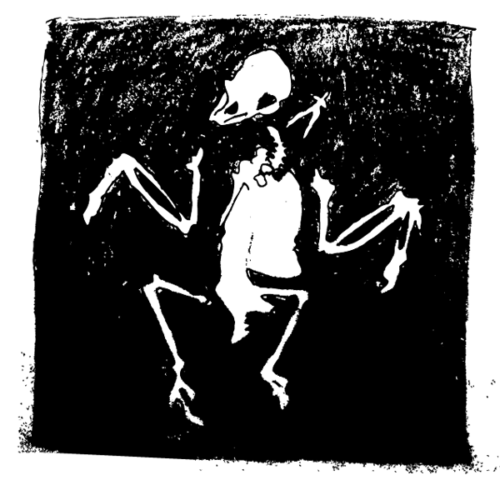
I’m a recent convert to podcasts. I usually prefer to devour my media through words, but after a friend introduced me to My Dad Wrote a Porno, I’ve discovered how much fun it can be to listen to a podcast over dinner. I usually play music, but I’ve been digging the opportunity to learn things while I’m cooking things.
I’m no podcast expert and I’ve only listened to a handful. Kevin J Anderson has a cool one called Creative Futurism. I love the SFF Marketing podcast for career and writing advice, and the Guilty Feminist for the giggles and the learnings.
A fellow writer friend recently introduced me to Criminal, a critically-acclaimed independent true crime podcast. Based in Durham, North Carolina, and released by Radiotopia for PRX, the show has been running since 2014 and racking up awards and acclaim for it’s anthropological approach to true crime.
Host Phoebe Judge has this beautiful husky voice that delivers each story with grace and restraint. There’s no relishing of gory details, no over-simplification or dumbing down. The subjects they choose are endlessly fascinating – from how fraudulent mediums pull off their tricks, and a woman who discovered her apartment was also inhabited by a silent stranger, to a visit to one of the forensic body farms where donated corpses are left outside to decompose so scientists can study them, and a clergy-run organisation in the 1960s that helped hundreds of thousands of women obtain safe and illegal abortions.
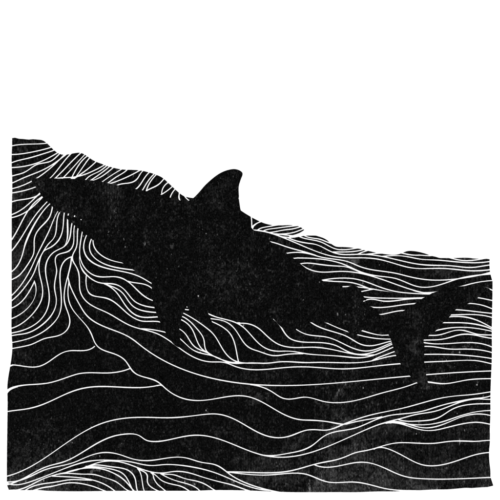
Artist Julienne Alexander creates a unique image for each episode, such as this one for episode 90, Sharks.
What I love about this show is how it delves into crime as a sociological and cultural construct. The stories are rooted in place and time and context and ask more questions than they answer. Many stories – such as the one about the escapees from Alcatraz – include interviews with people closely connected to the crimes or subject. Often, there is an unsolved mystery or a moral question posed, but you’re not beaten over the head with it. I’ve already had ideas for about ten books just from the episodes I’ve listened to, and it’s been a hugely entertaining distraction while I’m cooking.
Find out more about Criminal and listen to episodes on their website.



